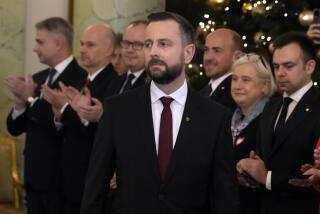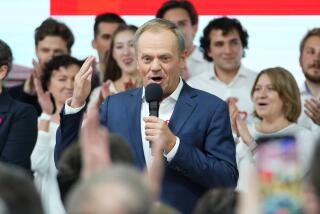Polish Army Retains Government Links : Military Officers Still Controlling Influential Civilian Posts
- Share via
WARSAW, Poland — The Polish army went back to the barracks with the lifting of martial law in July, 1983, but its influence in the communist government remains strong.
During the 19 months martial law was in effect, the country was run by a 21-member Military Council of National Salvation. About 8,000 officers served as commissars in the state administration, factories and universities, and thousands of soldiers patrolled the streets.
When martial law ended, Gen. Wojciech Jaruzelski, the Polish leader then and now, declared the army was “withdrawing to the second line.” But generals continue to occupy posts that control the security apparatus and personnel appointments to Communist Party and state positions.
Jaruzelski has given up his post as prime minister but he is still the head of state, first secretary of the party and armed forces commander. He seldom wears his army uniform anymore, opting instead for a gray business suit for public occasions.
3 More Generals on Politburo
But after the Communist Party Congress this past July, three more generals joined Jaruzelski on the ruling 15-member Politburo. They were Jozef Baryla, who is responsible for public security and internal party affairs; Interior Minister Czeslaw Kiszczak, head of the police forces, and Defense Minister Florian Siwicki.
In the ministerial post of head of the Council of Ministers’ office, Gen. Michal Janiszewski supervises the state’s personnel policy and is an important power broker between local officials and the central government.
Gen. Tadeusz Hupalowski heads the government’s main watchdog agency, the Supreme Chamber of Control, which investigates corruption and keeps a watch on officials.
Generals and colonels remain as governors in six of the 49 provinces, four fewer than in 1983.
Hundreds of junior officers who served as military commissars during martial law have since left active duty to take up civilian posts in the state administration.
Senior officers have claimed that under martial law, which was imposed in December, 1981, to stem the Solidarity uprising, the military not only suppressed anti-communist forces but also swept out many incompetent, inefficient officials from civilian establishments.
Active in the Economy
Today, the army remains active in such non-military areas as the economy and the educational system.
Thousands of military conscripts work in steel mills, coal mines and in agriculture as a stopgap measure to fill some of the 300,000 officially registered job vacancies.
Officers lecture at schools, from kindergartens to universities. Military high schools with the most modern facilities have recently been set up in major cities. Draftees undergo intensive indoctrination to counteract non-communist influences from parents and the Roman Catholic Church.
“We eliminate, in part, deformations in the civic consciousness of recruits,” Siwicki told the party congress. “It (the army) serves a significant role in the process of national integration . . . in service for socialist Poland.”
With Communist Party ranks aging, it is significant that more than half the people under 30 who have joined the party in recent years were recruited while serving in the army, according to unofficial estimates.
More to Read
Sign up for Essential California
The most important California stories and recommendations in your inbox every morning.
You may occasionally receive promotional content from the Los Angeles Times.










